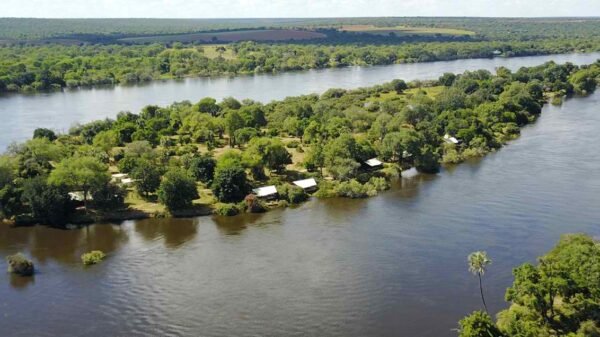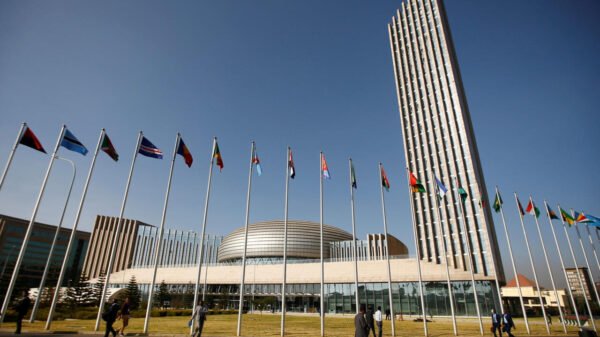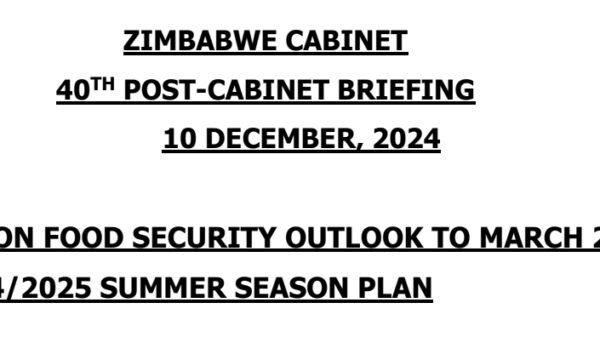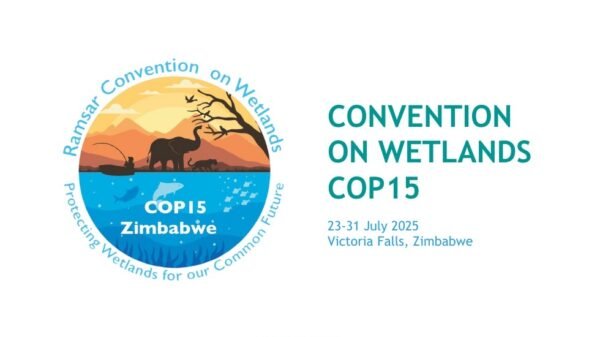Analysis
ZIMBABWE’S cabinet on 6 May 2025 approved the principles of the Climate Change Management Bill, a legislative proposal designed to address the escalating challenges of the climate crisis through a structured legal framework.
The Bill aims to regulate greenhouse gas emissions, promote low-carbon development, facilitate carbon trading and establish institutional mechanisms to support climate initiatives.

While the Bill signals Zimbabwe’s commitment to global climate goals, its success hinges on effective implementation, stakeholder engagement and addressing systemic challenges within the country’s socio-economic and political landscape.
Overview of the Bill
The Climate Change Management Bill is poised to serve as a cornerstone for Zimbabwe’s climate policy. Its key provisions include:
Regulation of greenhouse gas emissions
The Bill seeks to impose controls on emissions from industries, agriculture, and other sectors, aligning with Zimbabwe’s obligations under the Paris Agreement to reduce its carbon footprint.
Promotion of low-carbon development
It emphasizes sustainable practices, such as renewable energy adoption and energy-efficient technologies, to foster economic growth with minimal environmental impact.
Carbon Trading Framework
The establishment of a Designated National Authority (DNA) for carbon trading is a significant step. The DNA will oversee participation in international carbon markets, enabling Zimbabwe to monetise emission reductions through mechanisms like the Clean Development Mechanism (CDM) or voluntary carbon markets.
National Climate Fund
The Bill proposes a dedicated fund to finance climate adaptation and mitigation projects, such as reforestation, climate-smart agriculture, and infrastructure resilience.
Coordination of Climate Policies
By addressing gaps in existing statutes, the Bill aims to harmonise climate-related regulations across sectors like agriculture, energy, and transport, ensuring a cohesive national strategy.
These provisions reflect a proactive approach to climate governance, positioning Zimbabwe to meet its Nationally Determined Contributions (NDCs) while potentially attracting international climate finance.
Potential benefits
The Bill’s comprehensive framework could yield significant benefits for Zimbabwe, a country highly vulnerable to climate impacts like droughts, floods, and erratic rainfall. By regulating emissions, it addresses the environmental degradation caused by deforestation, unsustainable farming and reliance on fossil fuels.

The promotion of low-carbon development aligns with global trends toward green economies, potentially creating jobs in renewable energy and sustainable agriculture.
The carbon trading mechanism is particularly promising.
Zimbabwe’s participation in global carbon markets could generate revenue to fund climate initiatives, especially in rural communities disproportionately affected by climate change. The National Climate Fund, if managed transparently, could channel resources to critical areas like water security and food production, enhancing resilience against climate shocks.
Moreover, the Bill’s focus on coordination fills a critical gap. Zimbabwe’s current climate policies are fragmented, with overlapping mandates among ministries. A unified legal framework could streamline efforts, reduce inefficiencies, and enhance accountability.
Critical challenges and concerns
The daunting challenge for Zimbabwe is to scale-up investments for the renewable energy transition. The ultimate objective is to protect vulnerable communities from the impact of the climate crisis.
It must be stated, though, that scaling up the climate financing is easier said than done. We are talking of a badly managed economy which is already struggling to deliver jobs, social services and infrastructure critical for economic development.
Despite its ambitious goals, the Bill faces significant hurdles that could undermine its effectiveness.
Implementation capacity
Zimbabwe’s history of policy implementation is marred by bureaucratic inefficiencies, corruption, and limited technical expertise. The success of the Designated National Authority and National Climate Fund depends on robust governance structures, transparent financial management, and skilled personnel—areas where Zimbabwe has struggled.
Economic constraints
The country’s economy is grappling with hyperinflation, foreign currency shortages, and high unemployment. Transitioning to low-carbon technologies requires substantial investment, which may be challenging without significant external support. The Bill does not clarify how these financial gaps will be bridged, raising concerns about its feasibility.
Stakeholder inclusion
The cabinet statement lacks details on how local communities, indigenous groups, and the private sector will be involved in shaping and implementing the Bill. Without inclusive consultation, the legislation risks being disconnected from grassroots realities, particularly in rural areas where climate impacts are most acute.
Carbon trading risks
While carbon trading offers opportunities, it also carries risks. Global carbon markets are complex and often favour developed nations with greater technical capacity. Zimbabwe must negotiate equitable terms to avoid exploitation and ensure that carbon credits benefit local communities rather than multinational corporations.
Enforcement and compliance
Regulating greenhouse gas emissions requires stringent monitoring and enforcement mechanisms. Given Zimbabwe’s weak regulatory track record, there is skepticism about whether industries, particularly in mining and agriculture, will comply with emission standards.
Broader implications
The Climate Change Management Bill arrives at a critical juncture. Zimbabwe’s agricultural sector, which employs over 60% of the population, is increasingly vulnerable to climate variability. The Bill’s emphasis on low-carbon development and adaptation could bolster food security and rural livelihoods if paired with practical measures like drought-resistant crops and irrigation systems.
However, the Bill’s success will depend on its alignment with Zimbabwe’s broader development goals.

The country’s reliance on coal for energy, coupled with foreign investment in fossil fuel projects, poses a contradiction to the Bill’s low-carbon ambitions. Balancing economic growth with environmental sustainability will require bold political will and international cooperation.
Furthermore, the Bill’s focus on carbon trading and climate finance highlights Zimbabwe’s intent to engage with global climate mechanisms. Yet, the country must navigate a landscape where climate finance is often tied to stringent conditions from donors and institutions like the IMF and World Bank. Ensuring that these funds serve national priorities rather than external agendas will be crucial.
What must be done
To maximise the Bill’s impact, the following steps are essential:
Strengthen institutional capacity
Invest in training for the Designated National Authority and other bodies to ensure effective management of carbon trading and the National Climate Fund.
Engage stakeholders
Conduct nationwide consultations to incorporate the perspectives of farmers, women, youth, and businesses, ensuring the Bill reflects diverse needs.
Secure financing
Partner with international organisations and climate funds to mobilise resources for low-carbon technologies and adaptation projects.
Enhance transparency
Establish clear mechanisms for monitoring fund allocation and project outcomes to build public trust and deter corruption.
Align policies
Harmonise the Bill with existing energy and industrial policies to avoid conflicts and ensure a coherent transition to a green economy.
Implementation is key
Zimbabwe’s Climate Change Management Bill represents a bold step toward addressing the existential threat of climate change. Its provisions for emission regulation, low-carbon development, and carbon trading demonstrate a forward-thinking approach to environmental governance.
However, its success is not guaranteed. Systemic challenges like economic instability, weak institutions, and limited stakeholder engagement could derail its objectives. By addressing these hurdles through inclusive, transparent, and well-funded strategies, Zimbabwe can leverage the Bill to build a resilient and sustainable future.
As the legislation moves toward enactment, its true test will lie in translating principles into tangible outcomes for a nation on the frontline of climate change.–Staff Writer.






























